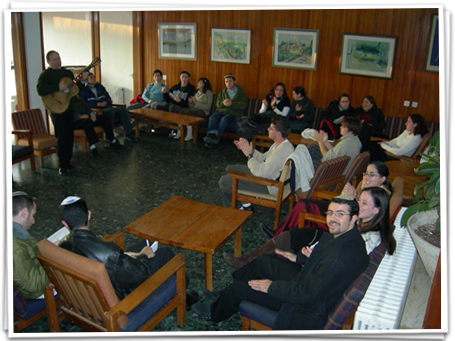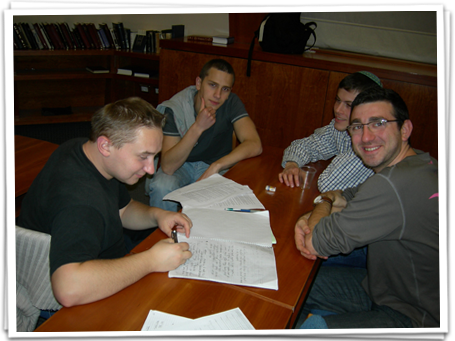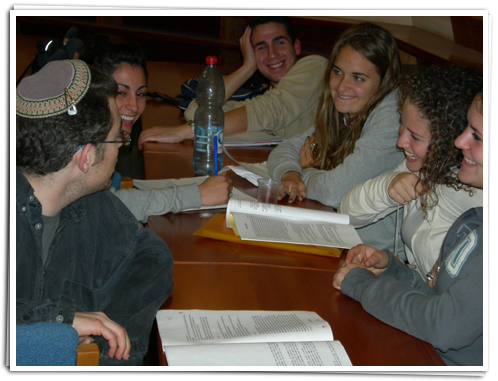The Learning Community for New Immigrant Students

With the major influx of Aliya to Israel from the Former Soviet Union, much effort and aid was put into the physical well being of the olim. However, little attention was paid to the fact that they came from countries that had denied them any opportunity for Jewish education or culture. Aside from this, Israeli society is quite complex and can seem confusing or even hostile to the new oleh. He or she needs to find a way to ‘fit in’ and be comfortable in their new society, so different than the one they were accustomed to. It has been our experience that these young olim are very interested in Jewish and Israeli History and culture, but have had little exposure to it, and are afraid of indoctrination of any type. The open, informal and friendly learning environment of the Chaverim project, where Israeli or veteran students, men and women, teach new immigrant students breaks down the barriers, creating not just a learning experience but a community settings. It is a totally student run program. The students celebrate the major holidays together, go on field trips and weekend retreats and find true friendships with their Israeli tutors who are their inroads into Israeli society.
 The Chaverim program is a learning community for over 200 new immigrant students annually, most of whom are from the Former Soviet Union, and the rest are from France, Ethiopia, North Africa, North and South America and various European countries. The program is run by Amutat Ner L’Elisheva with the help of Keren Klita, New York Federation, The Claims Conference against Germany, The Ministry of Absorption and private donors. There are six branches: the Meir Richman's Chapter at the Hecht Synagogue of the Hebrew University on Mount Scopus; at Hebrew University's Givat Ram campus; at Beit Avichai in downtown Jerusalem; at the Rehovot School for Agriculture; at Bar-Ilan University , where we work closely with the Dean of Students office and the Center for Jewish Studies; and at Ashkelon College. The program started in November 1999. The State of Israel was blessed with an influx of almost one million immigrants in the ninties and made enormous efforts to absorb them physically. However, many of these olim have little or no Judaica background and are struggling with their Jewish identity. We felt that if we could focus on the young people in the universities that we could have some impact and help them experience some type of Jewish studies and experiences in an open and non-coercive environment. The program caters to almost 200 students annually at the various campuses. Most of the participants have little background in Jewish studies and traditions, so that the program is their first ‘Jewish experience’ in Israel.
The Chaverim program is a learning community for over 200 new immigrant students annually, most of whom are from the Former Soviet Union, and the rest are from France, Ethiopia, North Africa, North and South America and various European countries. The program is run by Amutat Ner L’Elisheva with the help of Keren Klita, New York Federation, The Claims Conference against Germany, The Ministry of Absorption and private donors. There are six branches: the Meir Richman's Chapter at the Hecht Synagogue of the Hebrew University on Mount Scopus; at Hebrew University's Givat Ram campus; at Beit Avichai in downtown Jerusalem; at the Rehovot School for Agriculture; at Bar-Ilan University , where we work closely with the Dean of Students office and the Center for Jewish Studies; and at Ashkelon College. The program started in November 1999. The State of Israel was blessed with an influx of almost one million immigrants in the ninties and made enormous efforts to absorb them physically. However, many of these olim have little or no Judaica background and are struggling with their Jewish identity. We felt that if we could focus on the young people in the universities that we could have some impact and help them experience some type of Jewish studies and experiences in an open and non-coercive environment. The program caters to almost 200 students annually at the various campuses. Most of the participants have little background in Jewish studies and traditions, so that the program is their first ‘Jewish experience’ in Israel.
 Our educational goal is to give these young students the tools to help them define their own Jewish identities. They study classical texts from the Bible or Rabbinic works and discuss topics that range from the holidays, the Jewish calendar, to Kashrut, themes in Jewish history, Jewish ethics, Bible and Jewish philosophy. Our goal is that they be proud of being Jewish and Israeli and find some meaning in their heritage as well as to make new friends and have a good time. The program meets twice a week on campus at a designated room (usually the campus synagogue or a library) where we hold the group study sessions. Each session begins with a light supper. Apart from the small group discussions, there is a frontal lecture once a week. There are three to four weekend retreats a year and special events to mark Chanuka, Tu Bishvat, Purim, a model seder before Pesach, Yom Hashoah lecture by a survivor, Yom Hazikaron lecture by an IDF officer, Israel Independence day celebration, Lag Ba’omer bonfire and a pre-Shavuot learnathon. There are also a few day field trips as well.
Our educational goal is to give these young students the tools to help them define their own Jewish identities. They study classical texts from the Bible or Rabbinic works and discuss topics that range from the holidays, the Jewish calendar, to Kashrut, themes in Jewish history, Jewish ethics, Bible and Jewish philosophy. Our goal is that they be proud of being Jewish and Israeli and find some meaning in their heritage as well as to make new friends and have a good time. The program meets twice a week on campus at a designated room (usually the campus synagogue or a library) where we hold the group study sessions. Each session begins with a light supper. Apart from the small group discussions, there is a frontal lecture once a week. There are three to four weekend retreats a year and special events to mark Chanuka, Tu Bishvat, Purim, a model seder before Pesach, Yom Hashoah lecture by a survivor, Yom Hazikaron lecture by an IDF officer, Israel Independence day celebration, Lag Ba’omer bonfire and a pre-Shavuot learnathon. There are also a few day field trips as well.
The educational program runs throughout the academic year including the studying basic Judaism twice weekly in small groups with a student teacher as well as hikes and weekend retreats to experience the land and the traditions first hand. Once a week the topic is bible and the second meeting is various topics. Among the topics taught are: the Jewish holidays, Shabbat and prayer (in preparation for Shabbat weekends) Kashrut, the Jewish calendar, loving your neighbor, belief in God, biblical personalities and more. In addition the program offers a conversion program in conjunction with the Jerusalem rabbinate, for students of mixed marriages who would like to stabilize their Jewish status. The project is extremely popular and is continuously growing.